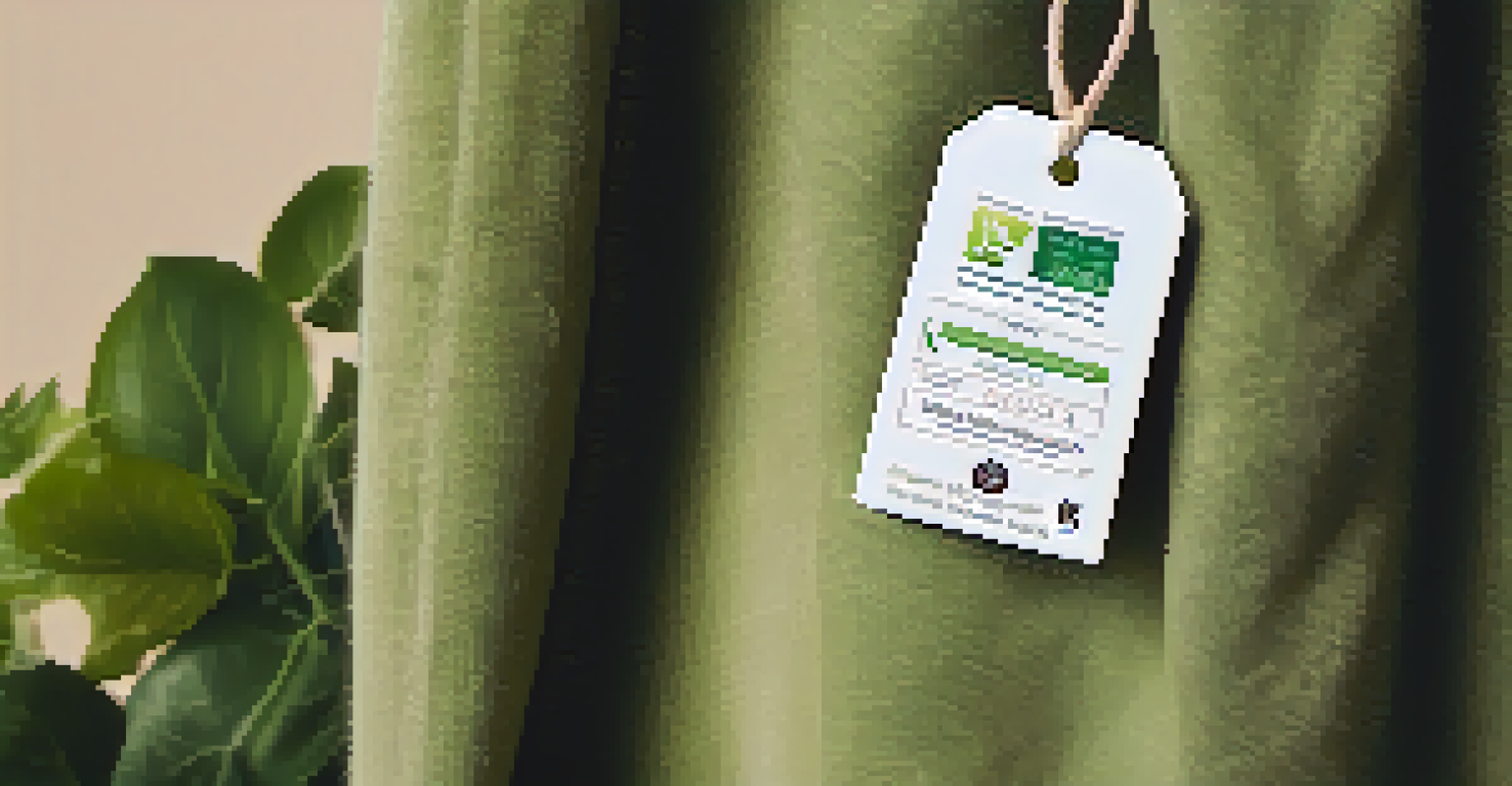The Role of Certification in Sustainable Fashion Choices

What is Sustainable Fashion and Why Does It Matter?
Sustainable fashion refers to clothing that is designed, produced, and consumed in ways that minimize harm to the environment and society. Think of it as a fashion approach that seeks to balance style with ecological responsibility. With issues like pollution and poor labor practices in the textile industry, understanding sustainable fashion is essential for consumers who want to make a positive impact.
Fashion is the armor to survive the reality of everyday life.
This concept not only involves the materials used but also the entire lifecycle of a garment—from production to disposal. By choosing sustainable options, consumers can reduce waste and lessen their carbon footprint. It's like choosing to plant a tree instead of cutting one down; it’s a small decision that can lead to big changes.
As awareness grows, more consumers are demanding transparency and ethical practices in the fashion industry. This shift is slowly reshaping the market, pushing brands to adopt sustainable practices. In this landscape, certifications play a key role in helping consumers navigate their choices.
The Importance of Certification in Fashion Sustainability
Certification acts as a trustworthy badge that informs consumers about a brand's commitment to sustainable practices. These certifications are often issued by third-party organizations that evaluate and verify a brand's practices. It's like having a friend who has tried the restaurant before and can vouch for its quality—certifications provide that reassurance.

Brands that earn certifications must adhere to strict guidelines, which can include everything from sourcing materials responsibly to ensuring fair labor practices. For consumers, these certifications simplify the decision-making process, allowing them to confidently support brands that align with their values. It’s a way to shop smarter, not harder.
Sustainable Fashion Explained
Sustainable fashion minimizes environmental and social harm throughout the lifecycle of clothing.
Moreover, certifications can encourage brands to continuously improve their sustainability efforts. When a brand knows it will be evaluated, it has an incentive to adopt more eco-friendly practices. Thus, the presence of certifications not only aids consumers but also drives positive changes within the industry.
Common Certifications to Look For in Sustainable Fashion
There are several well-known certifications that consumers should be aware of when shopping for sustainable fashion. For example, the Global Organic Textile Standard (GOTS) ensures that textiles are made from organic fibers and produced in an environmentally and socially responsible manner. It's like having a seal of approval that confirms a product meets high sustainability criteria.
Sustainability is no longer about doing less harm. It's about doing more good.
Another example is the Fair Trade certification, which focuses on fair labor practices and equitable trading conditions. When you see this label, you can feel good knowing that the workers behind your clothing are treated fairly. It's the fashion equivalent of buying locally sourced food, supporting communities rather than big corporations.
Other certifications, like OEKO-TEX, ensure that textiles are free from harmful substances, adding another layer of safety for consumers. By familiarizing yourself with these certifications, you’ll be better equipped to make informed choices that align with your values, ensuring your fashion purchases are as ethical as they are stylish.
How Certifications Influence Consumer Behavior
Certifications can significantly influence consumer purchasing decisions. Many shoppers actively seek out certified products, viewing them as more trustworthy and reliable. When a customer sees a certification label, it often boosts their confidence in the brand, making them more likely to complete the purchase.
In addition to building trust, certifications can also enhance brand loyalty. If consumers feel aligned with a brand's sustainable values, they are more likely to return for future purchases. It’s akin to finding a favorite café—you keep coming back because you love what they stand for and how they make you feel.
Certifications Build Trust
Certifications serve as reliable indicators that help consumers identify brands committed to sustainable practices.
Furthermore, the rise of social media and influencer marketing has amplified the importance of certifications. As more influencers advocate for sustainable fashion, the visibility of these certifications increases, encouraging their followers to make more environmentally conscious choices. This creates a ripple effect, inspiring more consumers to embrace sustainability.
Challenges in the Certification Process
While certifications provide valuable insight, the process can be complex and challenging for brands. Many smaller, emerging fashion labels may struggle to meet the stringent requirements set by certification bodies. This can create a barrier for brands that genuinely want to adopt sustainable practices but lack the resources to obtain certification.
Additionally, the sheer number of certifications can confuse consumers. With so many labels and standards, it can be overwhelming to determine which certifications genuinely reflect a brand's commitment to sustainability. It’s like trying to choose a dish from an extensive menu—you might end up feeling lost and unsure of what to pick.
Moreover, some certifications may lack transparency or rigorous enforcement, leading to 'greenwashing,' where brands exaggerate their sustainable efforts. This highlights the importance of consumers doing their own research, ensuring that the certifications they trust are legitimate and meaningful.
The Future of Certification in Sustainable Fashion
As the demand for sustainable fashion grows, the future of certifications looks promising but also challenging. We may see the development of new, more accessible certifications that cater to smaller brands, enabling them to showcase their efforts without being overwhelmed by bureaucracy. This could open the door for more brands to participate in the sustainable fashion movement.
Additionally, advancements in technology could enhance the certification process. For example, blockchain technology could provide transparency and traceability in the supply chain, allowing consumers to verify the claims made by brands. Imagine being able to scan a QR code on your clothing to see exactly where it came from and how it was made—this could revolutionize the way we shop.
Consumer Choices Matter
Informed consumers can drive the demand for sustainable practices by supporting certified brands.
Finally, as consumers become more educated about sustainability, they will likely demand even greater accountability from brands. This pressure could drive more brands to pursue certifications and adopt sustainable practices, creating a more ethical and eco-friendly fashion landscape.
Making Informed Choices: A Consumer's Guide
To navigate the world of sustainable fashion effectively, consumers need to educate themselves about different certifications and what they signify. Start by researching the most reputable certifications and understanding what they entail; this knowledge will empower you to make informed choices. It’s like arming yourself with information before going into a negotiation—you’ll feel more confident and prepared.
When shopping, take the time to look for these certifications on clothing tags or brand websites. Don’t hesitate to ask brands questions about their sustainability practices; a reputable brand should be eager to share information. Think of it as having a conversation with a friend about their favorite book—you’re genuinely curious and want to know more.

Lastly, remember that every small choice counts. Even if you can’t completely overhaul your wardrobe, opting for a few certified sustainable pieces can make a significant difference over time. Just like planting a garden, each small seed you plant contributes to a larger, more beautiful landscape.